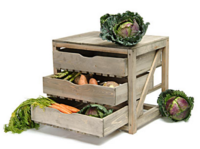Vegetables
From DT Online
The importance of vegetables in our diet has been established now for many years. - During World War II the British public were encouraged to DIG FOR VICTORY and produce their own vegetables. The conquering Empires of Rome and Islam established large scale vegetable production in their colonies and settlements, and when Columbus discovered the New World, Europe was graced with a greater variety of vegetable crops.
However in many ways vegetables are undervalued, seen simply as an accompaniment to meat meals and we ignore the exciting variety of vegetable dishes that can be made.
| Varieties |
|
|
| Health Benefits | Vegetables contain a great deal of water, but are a good source of vitamins and minerals.
It is hard to make general statements about the nutrient content of vegetables as different types vary in content considerably. With a leafy vegetable such as lettuce containing 96g of water per 100g and 15mg of vitamin C compared to parsley which has 150mg of vitamin C and less water. |
|
| Preparation | How Much of A Vegetable Is Wasted ?
Some root vegetables have tough skins and must be peeled but others such as carrots and potatoes may be scrubbed clean and eaten in their skins. There are vitamins and minerals under the skin which could be removed unless the vegetable is peeled thinly and by saving the whole of the skin some of the dietary fibre is also retained. |
|
| Cooking | "Most people spoil garden things by overboiling them. All things that are green should have a little crispness, for if they are overboiled they neither have any sweetness or beauty." Hannah Glasse, 1747 - The Art of Cookery Made Plain & Easy.
Vegetables are unpopular often because they are overcooked. By eating vegetables crisp and tender they are fresh and have some 'bite' rather than simply being a mushy mess. Steaming is a good way of cooking delicate vegetables such as broccoli florets. |
|
| Storage | Leafy vegetables lose vitamin C and water rapidly during storage and should therefore be stored for the minimum time in a cool place.
Potatoes should be stored in a dark, cool and dry place to prevent them from becoming mouldy and green, and to stop them sprouting. |
 |
| Preserving |
|